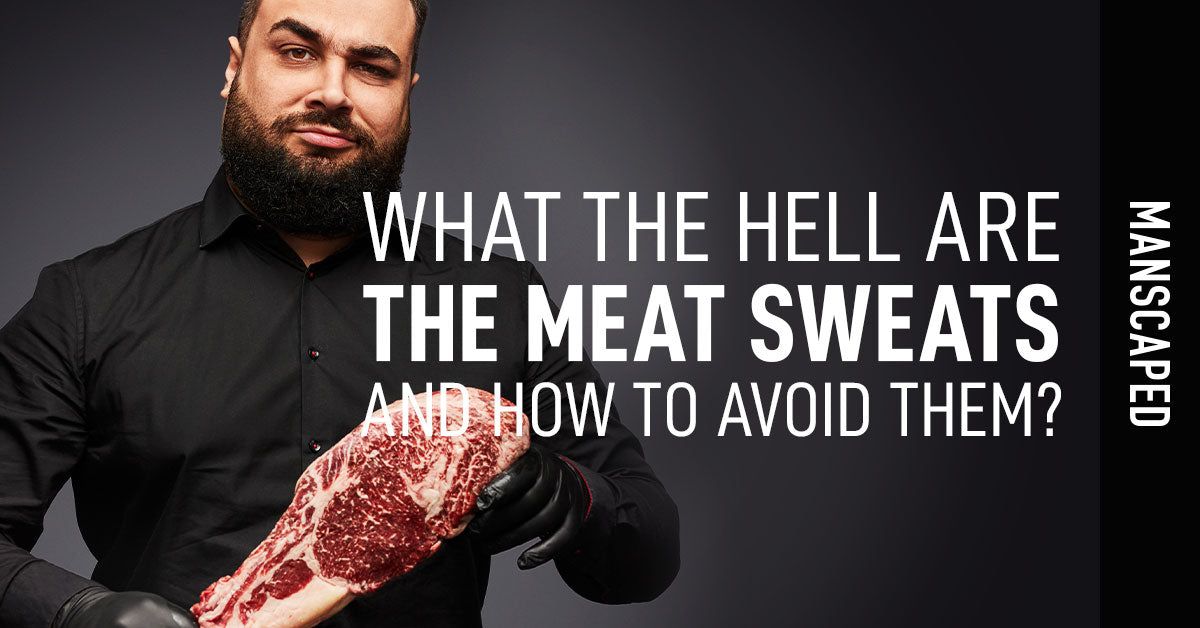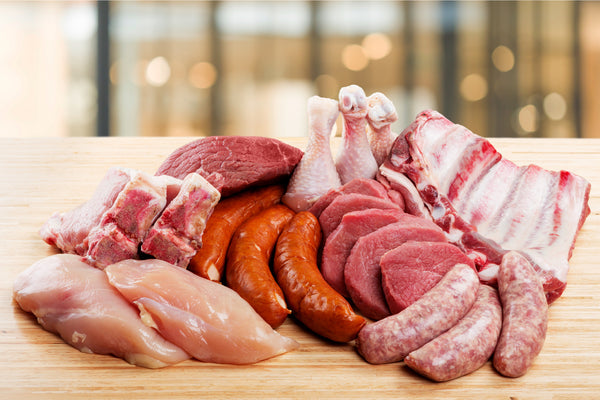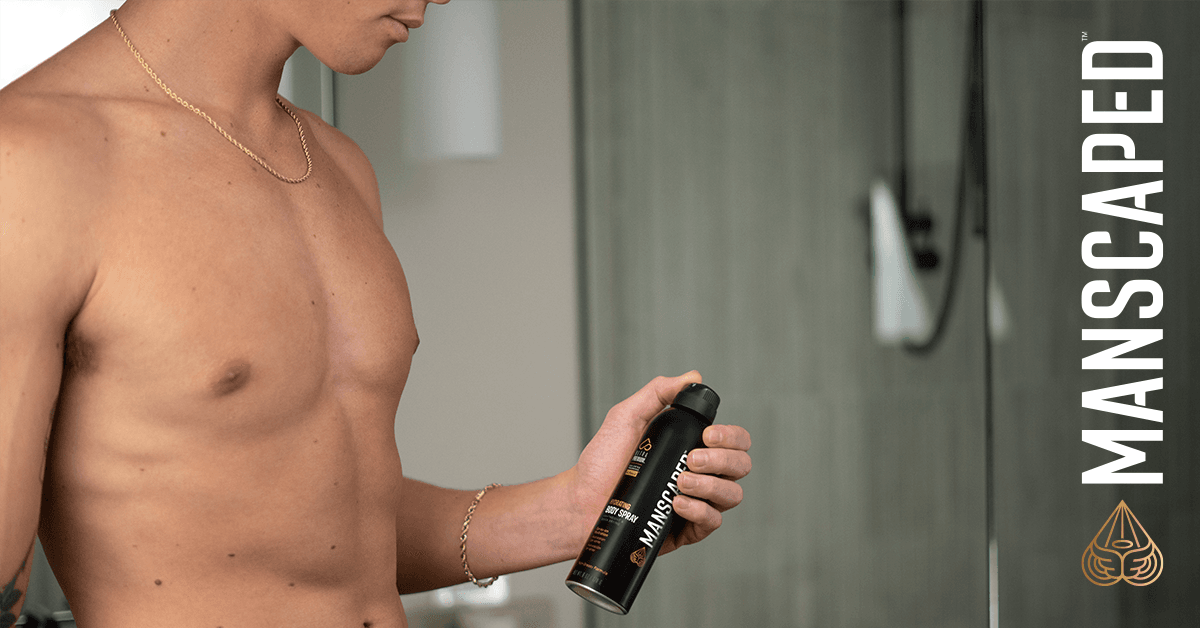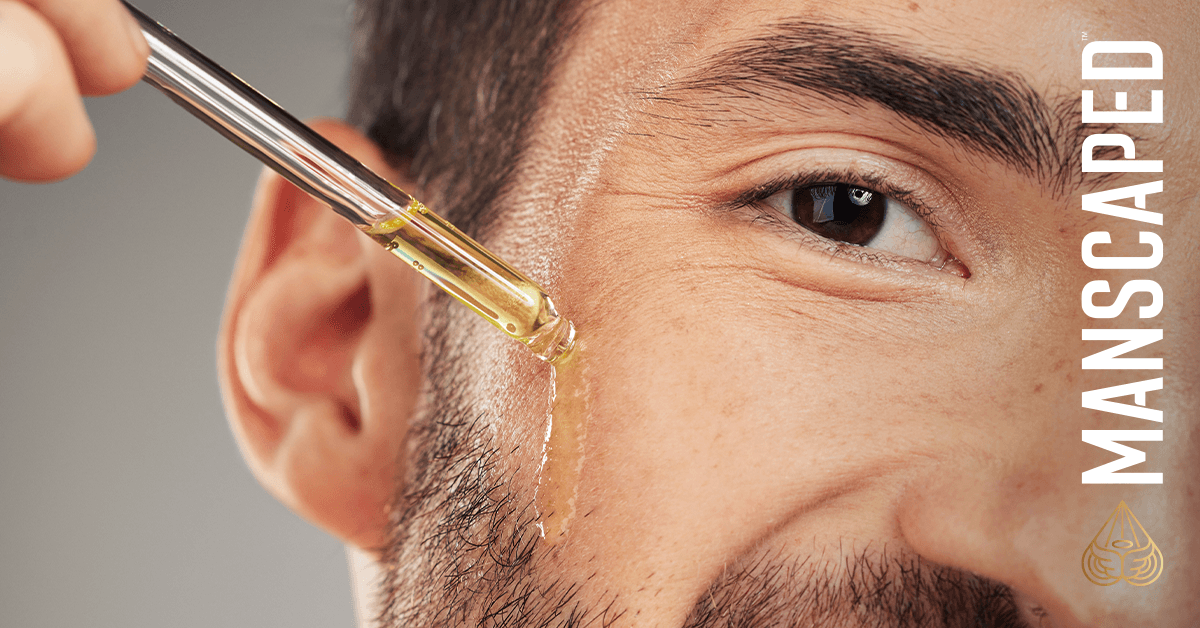
Have you ever watched competitive eating? It's crazy. A lot of guys scoff and think they can eat a lot of food. They're wrong. To set a world record, Joey Chestnut ate 74 hot dogs in 10 minutes. Think about that for a minute. Even if you got after it, you'd struggle to eat that many hot dogs in a week. Ten hot dogs a day is a lot of hot dogs. Most of us would be desperate for something else. (Obviously, Joey doesn't suffer from beef intolerance.)
If you've ever seen one of these competitions, you might have noticed that the eaters get sweaty. Maybe it's stress from the competition. Maybe they're just hot. Maybe something else is happening. A lot of people subscribe to the idea that meat sweats are a thing. The adage is that if you eat a bunch of meat (like turkey on Thanksgiving), you'll break into a nasty flop sweat. The suggestion is that the meat itself is the cause.
Other people swear this isn't a thing. They've been downing protein their whole lives and never encountered a single meat-induced drop of perspiration. Who is right? Are meat sweats a real thing? It turns out that this is not a question driving modern science (although it should be). So, we'll have to dig pretty deeply to answer these questions, but today, your burning meat-sweat questions will all be answered.
According to Science
This next piece will shock you, but meat sweats are not on a list of clinically diagnosed conditions. There's no medical literature that explicitly explains the phenomenon of sweating after eating a lot of meat. That means there's no single reason behind it all. That said, there are plenty of reasonable explanations, and if you've ever had meat sweats, it could be related to one or more of these underlying causes. Let's explore these reasons for the very real occurrence of meat sweats.
Protein Digestion
Researchers at Texas A&M have looked heavily into protein digestion. They weren't trying to figure out the meat sweats, but they made headway on solving the problem anyway in their research. According to their findings, everyone breaks down proteins a little differently during digestion.
Let's back up. Digesting a protein is a more involved process than digesting fats or sugars. Proteins can be very complicated, and that means your body has to do more to break them down into something it can absorb. At the root of all of this, the proteins are broken down by enzymes. That's true for everyone. But, the A&M team was able to show that the way each individual gets to that final step can vary radically.

Tying this back to meat sweats takes a lot of energy to digest a protein (because it's a complicated process). That alone is enough to make your body burn calories and generate heat. On average, 25 percent of the food you eat is burned during the digestive process. Now, if you're of physiology that is less efficient when it comes to breaking down proteins, you're going to generate even more heat during this process. Such people are more prone to getting meat sweats.
This research tells us that anyone can be at risk of a meat sweat. If you eat enough meat, the heat generated from digestion will raise your body temperature, and a nice flop sweat will ensue. Some people digest so efficiently that they would have to challenge eating records to ever get to that point. Other people might glisten after a single Slim Jim. It's all about body variance.
Intolerance
What we've learned is that the bulk of a meat sweat comes from the fact that digesting protein raises your body temperature. With that in mind, several other factors can contribute to the propensity for sweating. One of those is food intolerance.
You've no doubt heard of lactose intolerance; this occurs when a person doesn't produce enough of the enzyme (lactase) to digest sugars naturally found in milk. Since the body isn't breaking down the lactose, it makes its way to the large intestine. There, bacteria feed on the sugar and produce gas as a byproduct, leading to bloating, discomfort, gassiness, and even runs.
It turns out that you can be intolerant to a lot more than just lactose. Many people are intolerant to myoglobin; this is the protein in red meat that makes it look bloody if it's less than medium-well-done. That red juice isn't blood. It's water with myoglobin. The point is that many people are intolerant to myoglobin and that intolerance becomes more likely as you get older.
If you eat a nice red steak, and you have this intolerance, it increases gastrointestinal stress while you digest. Your body is already working hard to digest the meat, and now you've thrown it a curveball; this exacerbates the challenge, and you'll produce even more heat. Add to that the risk of a stress-induced sweat, and you have a new recipe for extra-smell meat sweats.
If this has ever happened to you, there are two easy solutions — neither of which are enjoyable. This first is to cook your steaks longer. It's a travesty, but a steak with no red juice (at least medium-well) isn't going to trigger a myoglobin intolerance. That takes the edge off of the problem and might leave you dry after a meal. If that's completely unacceptable, you can always cut steak from your diet. Life is about choices. You have to decide if the deliciousness of the steak is worth the discomfort. Who are we kidding? Of course, it is, but you might want to keep all of this in mind on your next fancy date.
Allergies

It's important to understand that allergies are fundamentally different from intolerance. Being unable to digest something has nothing to do with an allergic reaction. You typically can't be allergic to foods you can't digest. An allergy is an immune response to something you touch, eat, breathe, etc. Basically, no one has a meat allergy. We all need protein to survive, so meat allergies were weeded out of the gene pool a long time ago. That said, they do happen now and then.
Whether you have a meat allergy or not, general allergies can contribute to a meat sweat. It's a bit of a windy road, but the short version is that allergy symptoms increase stress levels, contributing to the problem. So, if you've had a problem with meat sweats, put a little effort into managing allergies. Don't eat the extra sausage if your mouth is a little itchy. It's pretty basic stuff.
Avoiding the Sweats
No matter the cause, meat sweats can be unpleasant. You're just trying to enjoy a delicious, manly meal. Why do you need to splash spectators in the process? There's no need for it, so let's discuss ways to manage your meat sweats. There are many tricks in the book, and we're going to cover the most effective among them. Some of these will be completely obvious. Others are ideas you haven't considered, even though you should have. Overall, our newfound understanding of the cause of meat sweats should be enough for us to figure out reasonable ways to keep it all under control.
Eat Less Meat
Did it hurt to read that? It's tough since meat is so amazing, but it is the easiest thing in the world. Very few people get meat sweats when they eat a properly portioned meal. Note: this isn't suggesting that you give up meat entirely. It's an important part of many balanced diets (no offense to our vegan brothers out there). But, if you put a little more effort into portion control, you'll trade the sweats for a healthier body. It's kind of a win-win.
If you're an athlete or someone who otherwise needs the protein, there's a compromise that can help. Focus on meats that are easier to digest. Trade the sausage and greasy foods for more poultry and fish. There's still a lot of protein, but there's less risk of intolerance, and the overall course of proteins is simpler than what can be found in beef and pork. You can also make sure you have enough fiber in your diet to aid the digestive process. Cutting complicated sugars in a protein-heavy meal can also help. All of this may be enough to stave off the perspiration; it may not.
Cook Steaks Longer
We already touched on this. There's something to be said for the juicy flavor of a beautiful steak pouring that red juice all over the plate. There's also something to be said for enjoying a meal that doesn't send you straight to the bathroom. You might find that when the steak hurts less, you like it even more. Besides, if you learn to cook, you can make a well-done steak that is plenty juicy. It only turns to jerky under the care of an incompetent hand.
It's also important to point out that this trick only works for red meat. If you aren't cooking your pork or poultry well-done, you're probably not long for this world. Those diseases are rough. So, with other meats, you can't really overcook them to improve digestion. Still, any trick to make digestion easier is worth knowing.
Keep Cool

At the end of this talk, the meat sweats are being caused by an increase in body temperature. If controlling digestion is out of the question, then you need merely keep yourself cool. Try to plan your meat smorgasbords for air-conditioned settings. Wear light, airy clothes. Keep a pocket fan on you if you must.
Of course, all of this overlooks the best and easiest way to stay cool when you get after the meats. Drink ice-cold beer. Seriously. If you down a few brewskis that are cold enough, they'll actively lower your body temperature. They'll make sweating a lot less of a problem, and they'll fill you up a little. That will help you reduce the meat-eating enough that you might be ok.
Any iced drink is sufficient. Beer is the fun drink of choice, but iced water is just as effective. We can even begrudgingly admit that it's the healthier choice too.
Improve Your Hygiene
Let's just assume that you regularly use deodorant on your armpits. If not, then why are you worried about meat sweats? You smell bad anyway. So, if deodorant can help your armpits, can you think of any way to control a meat sweat?
Stop, stop, stop. Do NOT start rubbing your antiperspirant stick all over your body just to enjoy a nice meat platter. That's ridiculous. There's an entire industry dedicated to controlling body sweat. Invest five minutes of effort to find products that are meant to be used all over. There's ball deodorant, foot deodorant, ball wipes, and all manner of things that are going to get the job done.
When you research, focus on antiperspirants. They'll typically have aluminum in them, and that's important. That's the ingredient that reduces sweating, and that's going to help you when you go to town on some meat. If you don't get antiperspirants, you're still going to flop sweat, but you can use products that will keep it from being as smelly an experience as it could be.
Take Better Care of Your Skin
Taking care of your skin fits with hygiene, but many guys still don't understand skincare. It has a huge impact on sweating and body odor. When your skin is healthy, your sweating is more efficient. That means you need to ooze less smelly fluid from your skin to keep cool, even after eating meat.
The most important thing most guys miss is exfoliating. When you shower, use a loofah (or something comparable). Gently — scrub all of the skin on your body when you get soapy; this removes dirt and oil from the pores. Doing so enables the sweat glands to work a little better, and it takes the edge off of your sweats.

If you use a pH-restoring soap, it will help your skin's protective barrier stay in top shape; this is how your body naturally manages bacteria on the skin. The point here is that if you have healthy skin, the sweat you can't prevent won't stink nearly as badly. That's because you're limiting bacterial growth, and it's the bacteria on your skin that make your sweat stink.
Steer into the Curve
There's still a little warm weather left. The last way to deal with meat sweats is to let them happen. Simply mask them by making everyone else sweat. If you really need to get your meat on, have an outdoor barbeque. Be the grill master. Make sure it's hot as hell. Get everyone to play the most physically involved games possible. A volleyball pit is a big winner here.
If the activities surrounding meat-eating get everyone hot and sweaty, it won't be a big deal when your meat sweats kick in a little later. You're masking the problem by bringing everyone down to your level, and that's really what life is all about.
The more advanced version of this is to simply not care about your meat sweats. Shrug off the self-conscious feelings and enjoy your meat with no shame. It's kind of like dancing like nobody's watching, but even people who don't see you sweat will probably smell you. If you can power through that thought, then you might be ready to explore the world of competitive eating. Congratulations. You've hit a high level of manliness.
Now You Know How To Avoid Meat Sweats
Alright. We've all had some fun. Let's recap so we can all move on to the next time sink the internet has to offer. Meat sweats are a real thing, but science hasn't really looked into them. We're pretty sure they're primarily caused by the heat your body produces when digesting protein. They're not the hardest thing in the world to control. If you really need to stuff your face full of protein, there are steps you can take to deal with the sweat.
03.12.21
Share

Featured Articles
- Your Favorite Ball Deodorant. Now with a New Scent: Perservere.MANSCAPED® + TCS for Testicular Cancer Awareness MonthIntroducing The Lawn Mower® 5.0 Ultra TCS Special Edition and TCS Ball Hero BundleThe Dome Shaver™ Pro vs. The Dome Shaver™ Plus: Which Should You Choose?The Chairman™ Pro vs. The Chairman™ Plus: Which Should You Choose?



